 Iran’s Attack on Israel
Iran’s Attack on Israel
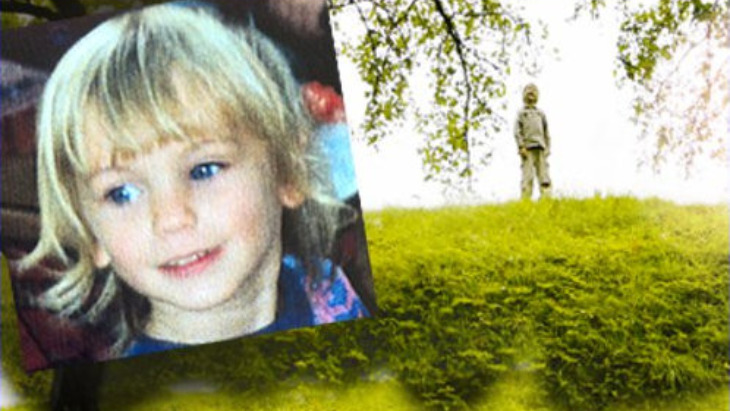

21 min read
Reflections on raising and burying my 19-year-old son with bi-polar disorder.
I always thought my pack of six children was a lot, until I saw the older five clinging to each other in one group hug at the grave side of my youngest. Then it seemed so small.
I had six kids in seven-and-a-half years. Doni was the prince of the family. All the older kids doted on him and he charmed strangers as well. His golden hair and clear blue eyes turned heads as I pushed him in the stroller and as he tumbled through the playground. Every morning after breakfast he would climb on the table and mix and pour, combining drinks and leftovers, experimenting with textures and tastes. He seemed like a tiny mad scientist and I thought he might follow in my paternal grandparents’ footsteps and become a chemical engineer.
 Doni as a child
Doni as a child
Clearly, science was a love of his. He asked me relentless questions as soon as he could articulate them: What makes mattresses bouncy? If you poke a hole in an electrical wire will the electricity come pouring out? How do you build buildings taller than cranes?
With six little ones, and always a few extra kids in the house, I was tired and didn’t always focus on the answers. Sometimes I’d say distractedly, “I don’t know” and move on.
One day we were in the garden. He asked, “Are there a lot of ants in this garden?” “Yes,” I answered as I dug a hole for flowers. “Are ants good diggers?” he continued. “Yes they are,” I replied, focusing on getting the hole just right. “How much do you think an ant could dig in a day?” “I don’t know” I replied, distracted. Perturbed, he responded, “It’s not an ‘I don’t know’ question; it’s a ‘what do you think?’ question!”
At five he said, “I don’t want to stay here.” He was referring to the world.
Doni loved to think, to wonder, to experiment. He tested everything. He tested recipes. He tested his theories. He tested locks. He tested rules. He tested his parents. He tested his teachers.
School was a challenge for him. He was clearly bright, but he didn’t think like his teachers, or anyone else, expected. Few wanted to take the time to really listen and discuss with a constantly questioning child. The main thing was to get him functioning in a class room and doing what was expected.
At five he told me, “I didn’t ask to come here and I don’t want to stay.” He wasn’t referring to school. He was referring to the world. By seven he was diagnosed with depression and ADHD and was taking medication for both.
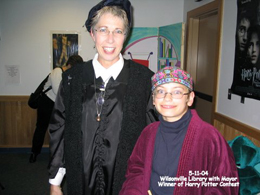 Doni at a Harry Potter event
Doni at a Harry Potter event
Even medicated, school was a dark zone in his life. He enjoyed some things, but most of it was a struggle and burden. Not just the school work, but the bus ride, the friendships, the schedule, the interactions with teachers, it was all a challenge. I began to drive him myself, to skip the bus ride and spend some time with him in the morning, but he regularly went to school crying.
He talked a lot about wanting to die. He regularly asked me why he should do his homework if he is just going to be dead tomorrow. “Just in case you’re not, let’s get it done,” I answered. What’s a mother to say?
I kept him home often for “mental health days.” I took him to the doctor, we adjusted his medicine. Still, we talked so often about his desire to die that I couldn’t be shocked any more. It was just part of raising Doni.
At the end of fifth grade he had a breakdown and he couldn’t finish the year. He asked to live in the forest for a month to recover. So I sent him to Oregon to stay with my mother, who at the time, lived in a house in the middle of a forest. She pitched a tent for him in the middle of the trees so he could have the full experience.
The next year we changed schools, but sadly, Doni had a lot of contact with a first-year teacher who was impatient and demeaning, and who had no desire to reach out toward a complicated student. Doni’s interest in computers was beginning to strengthen, so when he was assigned a Powerpoint presentation for his computer class about “How You Feel about School,” he spent a lot of time perfecting it. When the teacher asked who was ready to share, he volunteered first. His presentation was entitled, “The Vortex of Swirling Evil.” One of his slides included his wish that both he and his teachers would be dead. Before he could go further he was in the office, and I was told to come pick him up.
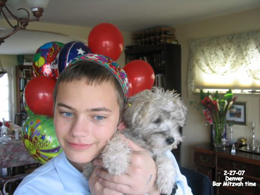 Doni with his dog
Doni with his dog
He couldn’t understand what he did wrong. They asked for a presentation about how he felt about school. He created just that. Meanwhile the school administration was worried; they wanted a letter from a psychiatrist attesting to his safety before they’d allow him back in school.
I worried for my son. How could I let him stay in an environment that he experienced as a vortex of swirling evil? Was there somewhere he could be happy and still get a Jewish education? How long could he live a life of wanting to die?
I felt so alone in pulling him through each day. My oldest was in Israel for seminary, my second was away for high school and the other kids each had their own school situation that needed my attention. My husband was a support, but the bulk of the hours were mine. And who could I even talk to about it? I had few friends close enough, but the words of Stevie Wonder’s song “Just Go Have a Talk with God” regularly played in the back of my mind. God was my constant companion. I didn’t have to explain the details to Him; I could just vent my frustration and ask for help. I started to say the morning blessing “who gives strength to the weary” with deeper concentration. I needed more strength.
I was beginning to wonder if there was something more going on than depression. Doni missed social cues and often misunderstood what people were expecting of him. He was so literal and extremely truth and fairness oriented. He got very angry if his sense of justice was trampled. He often explained things in ways that made a lot of sense to him and very little sense to others. He didn’t like to get his picture taken because he “didn’t know how to smile.”
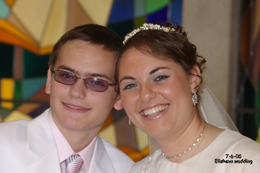 Doni with his sister
Doni with his sister
In raising the other kids, I had learned about and dealt with a lot of other issues: ADHD, sensory integration, asthma, anxiety, dyslexia, executive function disorder, anger and defiance. But with all that, I couldn’t figure Doni out. Something was being overlooked. I started to do more reading and began to wonder about Asperger’s Syndrome.
His psychiatrist dismissed it, telling me that Doni had the worst case of childhood depression he had ever seen and that “carrying that heavy a cognitive load” could produce symptoms that were Asperger’s-like. I had never heard of a “cognitive load” before and the way he explained it away made some sense.
We all agreed that “alive” had to come before “Jewish.”
My mother pushed me hard to explore sending him to a special private school for kids with learning differences. Clearly he was misunderstood, whatever was going on. Our local Jewish schools were not equipped to deal with him, and we all needed more support. Doni was in so much pain and was having such a hard time with his teachers and others in our community that his connection to Judaism was fast collapsing. I hated putting him in a non-Jewish environment, but there just didn’t seem to be a better option. We all agreed that “alive” had to come before “Jewish.”
Doni blossomed at Denver Academy. A few weeks after he began seventh grade, his teacher sent a note home, “Doni is a rock star! I love his quirky personality.” Amazing, a teacher loved him. And she said so. And what a great word, “quirky.” Just descriptive, not pejorative. It was so refreshing. He was quirky, and cute, and the smiles started to come back.
Doni’s school work picked up and his interest in computers started to surge forward. He disassembled and reassembled just about anything electronic he could get his hands on, and usually he had very few parts left over. At first he broke a lot of things, lost a lot of files, killed a lot of screens, caused a lot of heartache, cost a lot of money, but eventually he got really good at it.
He made friends, he got along, he left his tzitzis home and kept his yarmulke for the first year. Inside his 12-year-old guts, it became clear to him: the Jewish world was harsh and dark, the Gentile world was kind and friendly. When his bar mitzvah approached he wanted to skip it; he didn’t feel comfortable going to shul and he certainly didn’t want to celebrate there. In the end, he agreed to go to shul long enough to get an aliyah, and to have a family lunch at home. In classic Doni style, he connected electro-magnetism to the cherubim for his “dvar Torah.”
He began to spend a lot of time online, learning and experimenting. I tried to limit his screen hours but they were his happiest. He needed to spend time in cyberspace. I put a password on the computer. He cracked it. I put a timer on the computer. He hacked it. I put a net-nanny on the computer. He bypassed it. I put my foot down about limiting the amount of time and he started getting up in the middle of the night to spend a few extra hours in front of the screen while I was asleep.
By high school he was a computer expert and emerging science geek. He became a music lover and a cook. He watched lectures online and Youtube science experiments and technology blogs. He began to work with the IT staff fixing computers for the school and he became the go-to guy for all things chip-based. But woe be unto anyone who touched his computer. He was very possessive, very particular, very unforgiving, and sometimes explosive. We all learned to tiptoe around his computer space and not to even place a note on his keyboard.
We changed doctors when Doni was in 9th grade. As we told the stories, the depression, the camera shyness, the angry outbursts surrounding his computer, our family skill at walking on eggshells around it, his computer genius, almost obsession, his late hours and little need for sleep, his ability to sleep for almost a full 24 hours on the weekends… some questions arose in the new doctor’s mind. Had we ever considered bi-polar disorder? Had we heard of Asperger’s Syndrome?
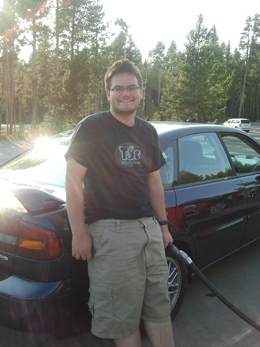 Filling the tank at Yellowstone
Filling the tank at Yellowstone
I began to learn more about both. Doni began to take lithium. I began to see cycling and to understand his sleep cycle as part of it. I saw his anger escalate and abate, I worried for him. I worried for us. Bi-polar disorder is progressive. The goal is to even out and not go up and down. Cycling can make it worse and worse.
Towards the end of 10th grade, Doni had a severe episode and needed to be hospitalized. As soon as he was stable, he evaluated the electric lock system of his locked unit. “You know,” he mentioned to a nurse, “if you just take a piece of tinfoil and place it over there, you can short the system and the door will be unlocked.” She looked at him aghast, “Please don’t tell anyone!” she pleaded.
In a few days his equilibrium and his sense of humor returned. When they asked him if he was “hearing any voices” he answered, “No, I’m not… And neither am I.” We told him he better cut that out if he wants to go home.
I felt vindicated. But I also felt trapped. This was bigger than I imagined.
In the hospital he was officially diagnosed with both bi-polar disorder and Asperger’s Syndrome. I felt relieved and imprisoned. Relieved because I was right: there was something big going on with him. It wasn’t my parenting, it wasn’t because I wasn’t raised observant, it wasn’t because I was his mother and always making up excuses for him. It’s because he really was harder than all the rest and he really did have issues I didn’t know how to handle. I felt vindicated.
But I also felt trapped. This was bigger than I imagined. Bi-polar disorder is a mental illness. Asperger’s is permanent. He will always need me. He’ll be my “forever child”. I thought about my daughter-in-law Gitty who had recently given birth to a child with Down’s syndrome, also a “forever child.” We could be forever parents together.
Things got much better from there. Finally, we knew what we were dealing with and we could medicate and accommodate accordingly. One of the aspects of Asperger’s is often an intense, even obsessive, interest in something. For Doni, of course, it was computers. He got more and more skilled and began to teach his teachers. His coding skills became so strong that he analyzed Firefox and offered them a better version of their code that they eventually incorporated.
We talked about all sorts of things. His anger melted, his hugs increased and he had a sparkle in his eye. We sang together and danced together. He wanted to learn how to Lindy Hop with me.
Still he told me that he didn’t plan on having children, he didn’t want to pass on his genes. And even though there were lots of things that he enjoyed and he had so many successes, he still reminded me that he didn’t actually want to be here at all. I was so used to hearing him tell me this that I had a chamber in the back of my mind for storing these sentences. I couldn’t let them be part of my everyday life with him.
After a few more bumps and triumphs, Doni finally graduated high school. Both he and I were thrilled to be done with mandatory schooling and he thoroughly enjoyed the quiet of the summer. While other graduates were eager to start college in the fall or were planning a “gap year” adventure between high school and college, Doni was clear that he needed more than just the summer “off.” He did not want to start anything in the fall; he just wanted to stay home.
When I expressed concern about his lack of schedule and goals, he assured me that he just needed to “chill,” to recover from 14 years of school, and that he would use the time to formally set up his new computer building/repair/consultation business. Those were actually golden months. He was home most of the time and I work from home, so we spent hours together bonding and sharing in ways we never got to before.
By January, I convinced him to start college. He reluctantly signed up for three classes at Metro State University 15 minutes away. He could have attended a nearby college of technology and began focusing on computers immediately, but he didn’t want to write the essay or set up an interview. I was surprised that he wasn’t willing to put that little bit of effort, but I figured he’d have a whole life of computers, so a little philosophy, politics and music appreciation would just round him out a bit.
What I didn’t see was his quickly ebbing motivation. He talked in broad terms of plans for the future, but he wasn’t actually making any. He enjoyed his classes and the discussion, but he dropped two of them when the reading got overwhelming.
Meanwhile he sunk into deeper depressions. He shared his feelings of readiness to die, of desire to die, but the lack of motivation showed up there, too. He didn’t actually want to kill himself; he just wanted to be dead. He even wondered aloud how he could make that happen, “Maybe I could just wander into a gang area wearing the wrong colors?”
He asked if I thought he should suffer forever, just to spare the family the pain of losing him.
We talked often about his feelings. He explained to me that he was living in pain and that it was not worth it to go on. He asked me for a reason to stay alive. Because he no longer believed in Torah, I couldn’t dip into my well of Judaic knowledge to share with him.
We read through websites with titles like “Reason to Live.” I told him how wonderful the world is and how much pleasure the future holds. He told me how hard the world is and how much pain there is yet to encounter. I told him how smart and creative he is and how much he could contribute to the world. He told me how much pressure that was and how the world would just have to survive without him.
I told him how much we all loved him and how devastated we would be if he was no longer around. He asked me rhetorically if I really thought he should suffer forever just to spare the family the pain of losing him. I did. He didn’t.
A few weeks later he swallowed poison. I found him as his lungs struggled for air, but he was already unconscious and his face was serene. The paramedics came and took him to the hospital where a whole team of doctors and specialists worked on him, but despite their best efforts he was slipping away.
The rabbi arrived and ruled that no further resuscitation attempts need be made. He said aloud "Shema" and Viduy, the confessional prayer, and then we all hugged and kissed Doni as the last flicker of life fluttered away. I squeezed his hand in loving disbelief, “You finally got your wish…” My little boy was gone.
In Jewish law, suicide is a terrible thing. One is not allowed to end one’s own life. One who does so is dealt with harshly in this world and the next. There is no shiva for a suicide, nor are there other burial rites.
Even though he swallowed the poison on purpose, it fell into the category of death from depression.
The rabbi was very clear with us that Doni’s death was not considered a suicide. Even though he swallowed the poison on purpose, it fell into the category of death from depression. Mental illness, he explained, can be fatal, just as illnesses of other parts of the body can be. When one has mental illness, one is not fully free to choose, and therefore one is not held fully liable for one’s “choices.”
It is vital to know that just because we use the word “suicide” in English to describe the act of ending one’s life, it doesn’t mean that Jewish law sees each of those acts as in that legal category. There is quite a bit of discussion about it in the Talmud and later codes, especially those written around the time of the Crusades, but nowhere do those discussions relate death-at-one’s-own-hand-because-of- mental-illness to the crime of suicide.
Doni had all the rites and ceremonies that any other Jewish death would require, and he is buried in the regular Jewish cemetery. We all sat shiva: five siblings and two parents, as the community poured into our house to console us. My husband is saying kaddish for him three times a day, and because Doni had no children to say kaddish for him, my husband will continue to say it for a full year, even though the formal mourning period is over for parents after 30 days.
Of course, our mourning will never end. We are his parents and he is our baby, our youngest. Our Forever Child is now a child forever.
I’m not sure what to say when people ask me how old my children are. Should I say my youngest is 19? How long should I say that? Or should I say my “new youngest” is 20 and keep going up with her age?
Six weeks later, I still find myself distracted and wistful. How could he have done it? How could it be so final? How could it be so real? I wonder if he’d change his mind if he knew then what he knows now. But that is trying to understand what he did with my rational mind. I have to keep reminding myself: Doni’s death wasn’t rational. He lived one of the most privileged lives on the planet ever in the history of time. He had a loving home, caring and supportive parents, fun and eclectic siblings, comfortable but not excessive resources, a free and safe country and all the health and creature comforts the 21st century affords to its first world inhabitants. Who would want to leave that? Millions of people with far less, who live far worse, cling to life with everything they have.
Mental Illness means something is wrong with the brain’s ability to think and process, affecting emotional, cognitive and behavioral realms to the degree that one has trouble coping with the ordinary demands of life. Mental illness has many forms and each one of them is on a spectrum. Like asthma, diabetes or Crohn’s disease, each person’s experience of their “defective” organ is different.
I don’t know why Doni’s soul was in a body with mental illness, but I do know that God had a reason.
Scientists may see mental illness as a fluke, bad luck of the draw. Our sages teach us that there are no flukes. Each body, each set of life circumstances, is carefully fashioned by God with love. Every soul is assessed and placed in a custom designed physical container and given a precise set of tools for its best growth and accomplishment during its sojourn on earth. Every detail is considered. What may seem dark is really a path to light; what feels so hard is really a path to growth; what feels like a dead end is really a door to a whole new world.
I don’t know why Doni’s soul needed to be placed in a body with mental illness, but I do know that God had a reason. And that God lovingly chose us, his parents, siblings and grandparents, to shepherd Doni for the 19 years and 3 months that he spent on Earth. Not only did Doni need his mental illness, we did too. God’s calculations are perfect, and He calculated that each of us needed those years of ups and downs, full of frustration and joy in our own experiences of Doni and his and our efforts to cope with the everyday.
Though we miss Doni so much, we are choosing not to see his life as “cut short.” Though we wish he was still with us, we know that God sends each person into the world for a unique journey and that some journeys end earlier than others. The part of my journey that included Doni was delightful and difficult, lovely and lonely, sensitizing and so sad. I wouldn’t ask for the experience, but now that I had it, I wouldn’t trade what I learned and gained from and with Doni for a life of comfort and peace. Though my sorrow at his loss is a constant stream running through my inner world, I am thankful for the growth and so happy for the time we shared.
Liluy nishmat Daniel Moshe a”h ben Ephraim Adam HaLevi
You can read more about Doni at http://www.abiteoftorah.com/doni-bulow.html The memorial website setup by his friends is http://w1n5t0n.net/
Note: I would like to publicly thank my mother, Oralee Stiles, for her careful thought and keen insight into Doni and for all her emotional support of him and of us. And I would like to thank my parents-in-law, Tova and Norman Bulow, for paying for Doni’s special schooling. It was expensive and we couldn’t have done it without their generous and long-term help.
